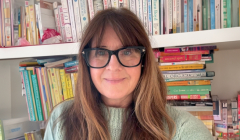
The Year Ahead: Breaking the taboo of gendered ageism at work
Let’s make 2025 the year we stop merely talking about breaking the ageism taboo and start building workplaces that reflect the full spectrum of talent and opportunity.

Leaders from Reckitt, Lego and Chelsea Football Club, share how a focus on inclusion has driven the brands forward

“Inclusion has been fundamental to creative excellence.”
Becky Verano, VP of Marketing at Reckitt, shared that Reckitt's focus on inclusion has driven its brand forward.
Speaking at the Creative Equals Rise conference, Verano shared how the company’s six Cannes Lions award-winning campaigns had DEI at the core.
“We aren't really an organization that went for the prizes, we are trying to build a culture that values creativity as a business driver,” she added.
Verano shared that at Reckitt every brand has a specific ‘brand fight’ linked to a UN ESG goal. An approach which has been revisited, as over time the company has recognised that not every single one of its brands can play in this space.
However, it has been a successful marketing step change for a number of the company’s leading brands. The ‘See My Pain’ Nurofen campaign, created by McCann London, focused on closing the ‘gender pain gap’, rather than individual product benefits. Verano credited the UK team with being open to a different approach, as historically product benefits have been a key focus point.
“For an FMCG business there were some difficult conversations about not focusing on the product,” shared Verano. The brand went on to achieve its highest ever earned coverage.
She urged the audience to play the long game, sharing that ‘See My Pain’ is a five-year commitment. Pointing to the success of Durex and Vanish, she added: “Each brand had a true role to play in the DEI space and every single campaign drove the brand forward.”
Carolina Teixeira, Global Brand Director at Lego, shared that inclusion is at the heart of Lego. “Play inclusion is at the heart of what we do. Our core belief is that creativity and play is a birthright for any kid in the world,” says Teixeira.
She believes that there is a genuine responsibility to build a better future by supercharging new creative mindsets and instilling a sense of belonging. It is an approach that she believes allows the brand to grow with new audiences, in a sustainable way.
“Play and creativity are so intimately connected,” explains Teixeira. She shared her belief that creativity is an open concept. Yet while much of creativity is still approached through a white, Western, European and male-dominated lens, we are only accessing a sliver of it as an industry.
Teixeira shared that she is passionate about opening up creativity through a new aperture and embracing the ethos that creativity is for everyone.
Sharing that Lego was often seen as a brand “for boys” she explained how the brand’s research underlined that the reasons behind this were deep-rooted gender stereotypes. “We created Play Unstoppable to challenge these gender stereotypes and talk about how we can unlock play for girls at a really early age.”
The discussion focused on sharing stories of how brands have overcome challenges and driven inclusion. “In marketing, we are great at finding stories. In our workplaces we need to listen to stories of how other people have dealt with backlash or stepped up to challenge,” explained Sophie Devonshire, CEO of the Marketing Society.
Reckitt’s Verano shared that moving to a virtual studio has created more space in the production process to prioritize inclusion and manage diverse casting decisions. “Technology can actually unlock some of the practical barriers to inclusion,” she explains.
She aims to get 80% of her shoots into a virtual studio model, which she believes will unlock more creative choices across the globe. Urging the audience to “be brave and try different things” she noted that technology can be a positive accelerator of change.
Teixeira shared that Lego has created guidelines and structures to guide local market messaging. She shared that as a global marketer, a “freedom within a framework” approach is vital because it creates the space for authentic storytelling.
She said that purpose and inclusivity are key drivers of the brand, adding: “If we are inclusive, if we are purpose driven, it helps us be a premium brand.”
Teixeira added that you cannot achieve all these goals alone, explaining: “Build relationships with grassroots communities, building those relationships it is so important.”
Marketing leaders explain what Inclusive leadership means to them
To learn more, sign up to receive our free RISE Trend Report here.


Photo credit: Bronac McNeill
Looks like you need to create a Creativebrief account to perform this action.
Create account Sign inLooks like you need to create a Creativebrief account to perform this action.
Create account Sign in